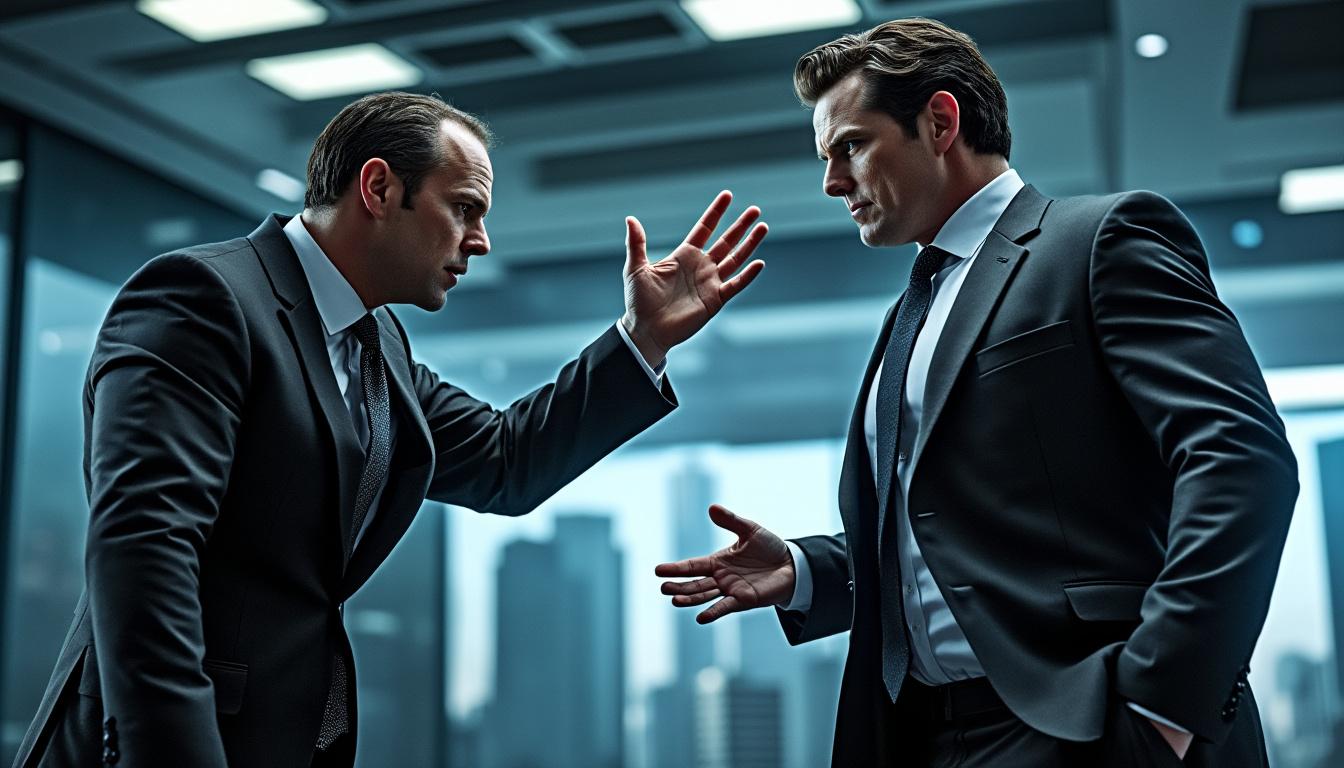The clash of titans within the DC Universe is not just about the heroes; it’s also an arena rife with complex villains. Recently, Sean Gunn, the actor behind Maxwell Lord in the upcoming “Superman” film, tackled a poignant question: How does Maxwell Lord’s villainy compare to that of Lex Luthor, a cornerstone of the DC Comics adversary roster? The discourse surrounding character motivations and moral ambiguity has taken center stage, especially as the DCU undergoes transformative shifts under the guidance of James Gunn. With characters layered in moral complexity, the debate opens inviting possibilities for storytelling, making it relevant to explore how these interpretations will shape the future of comic book movies.
Understanding Maxwell Lord’s Character in the DC Universe
Maxwell Lord, a character introduced to the DC Comics universe in 1987, has undergone various transformations over the years. Originally portrayed as a businessman with dubious motives, his character was crafted by Keith Giffen, J.M. DeMatteis, and Kevin Maguire. Lord was controversial, displaying both villainous traits and moments of altruism, which positioned him as a character capable of complex narrative arcs. Sean Gunn emphasizes this nuance, indicating that to label Lord merely as a villain would be overly simplistic. In dialogues with TheWrap, he refers to his brother James Gunn’s perspective that calling Maxwell a villain is reductionist. This commentary invites fans to reflect on the layers within Lord’s character that diverge sharply from more traditional portrayals of evil.
One of the roles Maxwell Lord aspires toward is that of a benefactor. His company, LordTech, aligns itself with altruistic goals, contrasting sharply with Lex Luthor’s embodiment of corporate greed. While Luthor’s portfolio is associated with exploits of power and corruption, Lord seeks to create a better world through his efforts with the Justice Gang. This juxtaposition highlights the core motivations that differentiate Lord’s ambitions from those of supervillains like Luthor.
Maxwell Lord’s Moral Compass
Within the upcoming adaptations, Sean Gunn’s portrayal diverges from prior iterations, particularly the flamboyant character played by Pedro Pascal in “Wonder Woman 1984.” Rather than being a one-dimensional villain, Gunn’s Lord encapsulates a character rich in motives that aspire toward social good. The evolution of Lord’s character is fueled by a desire to represent something more profound than malevolence, suggesting that his journey reflects the complexities of humanity. This complexity is delineated in various dimensions:
- Ambition vs. Morality: Unlike Lex Luthor, whose ambition often leads to destructive paths, Lord’s ambitions are rooted in wanting to improve society.
- Altruism vs. Malice: While Luthor enhances his corporate empire at the expense of morality, LordTech under Maxwell Lord aims for benevolence.
- Collaboration vs. Competition: Lex thrives on competition and defeating rivals. Conversely, Lord seeks alliances to foster progress.
The actor also hinted at potential character shifts, acknowledging that interpretations can evolve over time. As the narrative weaves itself into the broader fabric of the DC Universe, seeing how Lord navigates through partnerships and rivalries will be crucial. The established conflict with Lex Luthor fuels these character dynamics, providing fertile ground for audience engagement. Sean’s remarks about Lord’s moral complexity pave the way for compelling storytelling that resonates with evolving audience sensibilities.

Lex Luthor’s Iconic Villainy
Lex Luthor has long been characterized as one of the quintessential villains in superhero narratives. As a primary antagonist of Superman, Luthor personifies concepts rooted in power, greed, and malevolence. His ambitions are singularly focused on defeating Superman and asserting his dominance over Metropolis and beyond. Within the DC Comics continuum, Luthor’s character has been depicted in various forms, from the shrewd businessman to the megalomaniacal genius. Notably, his multifaceted nature serves as a rich tapestry against which other characters, including Maxwell Lord, are defined.
In many adaptations, particularly recent cinematic portrayals, Luthor’s depth mirrors the very essence of conflict in superhero narratives. His place in the Justice League’s trajectory has implications that extend beyond individual arcs. The tension between Luthor and Superman is palpable, translating a fundamental struggle between good and evil. It raises the stakes for other characters in the DC Universe, especially as a foil for Maxwell Lord.
The Duality of Villainy in DC Comics
The portrayal of villainy within the DC Universe often swings between clear adversaries like Lex Luthor and more nuanced characters such as Maxwell Lord. This duality sparks a discourse on what constitutes villainy within the context of comic book narratives. Luthor, as characterized in many adaptations, poses a significant threat that creates a clear moral line, impacting how heroes operate. Yet, with the rise of characters like Lord, audiences are invited to reconsider the complexity of villainous motivations.
- Intent: Is the villain’s intent inherently malicious? For Luthor, it often is. For Lord, it’s more complicated.
- Methods: Luthor employs coercion and deceit, while Lord is presented as collaborative and forward-thinking.
- Consequences: Luthor’s actions frequently yield destructive impacts, whereas Lord seeks to uplift.
Sean Gunn’s projection of Lord as a character seeking justice provides a refreshing contrast to Lex Luthor’s archetype. By challenging the traditional notions of villainy, this duality enriches the narrative landscape of the DC Universe. This depth reveals diverse interpretive avenues, making it both engaging and complex.
Examining the Influence of James Gunn’s Vision on Characterizations
The impact of James Gunn, as co-head of the DC Universe, on character portrayals reflects a broader intention to capture the essence of what audiences desire in storytelling. His perspective on Maxwell Lord emphasizes a revolutionary shift in portraying characters traditionally labeled as villains. As Sean Gunn articulated, the interpretation of Maxwell Lord stems from a commitment to delivering a more nuanced character, rather than one strictly confined to traditional villainy.
In interviews, James Gunn has been commendable about asserting that stories within DC should defy constraints that often arise from historical interpretations. His assertion that calling Maxwell Lord a villain is reductionist serves as a foundation for portraying Lord as a character driven by deeper values. This approach resonates with contemporary audiences who seek authenticity and depth in characterizations, allowing room for complexity rather than binary categorizations. It sets the stage for varying interpretations that could potentially redefine how characters interact with their respective heroes.
The Progressive Lens of Modern Storytelling
The evolution of characterizations in the DC Universe exemplifies the kind of modern storytelling that aligns with contemporary issues. Sean Gunn’s approach to Maxwell Lord could reflect themes of corporate responsibility and ambition in the face of global challenges.
- Corporate Responsibility: With a foundational commitment to making the world a better place, Lord embodies ideals that resonate with modern business practices.
- Redefining the Most Villainous: By showcasing Lord’s desire for altruism, audiences will engage in a dialogue about morality.
- Engaging with Society: Characters should reflect societal complexities, allowing for relatable narratives that resonate.
This narrative reworking offers creative opportunities that not only enhance the DC Universe but challenge conventions that have historically defined superhero narratives. As Sean and James Gunn head toward a new chapter in DC storytelling, the specter of Maxwell Lord emerges as one that intricately balances between good and evil, inviting refreshing explorations of heroism and villainy.

Future Implications for the DC Universe
The ongoing evolution of character dynamics within the DC Universe signifies a commitment to growth and adaptation in storytelling. Recently, Sean Gunn emphasized that the dichotomy between Maxwell Lord and Lex Luthor is just a starting point. The landscape for both heroes and villains in the DCU is expanding, with avenues for character development unfolding rapidly. As such, future films and series will inevitably explore these transformations, setting the stage for a new era in comic book narratives.
As Maxwell Lord progresses within the narrative, a key component lies in the possibilities that lie ahead in storytelling aspects. Themes that arise include redemption, morality, and the shades of gray that characterize human motivations.
Expectations for Upcoming DC Productions
- Collaborative Storytelling: With the vision of James Gunn guiding future narratives, interactions among characters will likely be complex.
- Integration of Nuanced Characters: Maxwell Lord’s character development may inspire future portrayals of similar characters seeking redemption or grappling with moral obstacles.
- Varied Adaptations: Each adaptation could explore different aspects of these characters, revealing how ambivalence and altruism can play roles in their narratives.
In presenting Lord not as an archetypal villain but as a multidimensional character, Sean Gunn aligns with contemporary expectations for character portrayals in the modern era of superhero storytelling. Ultimately, the exploration of morality and ambition in the narratives will provide insights into not just the characters’ journeys, but into society itself.


